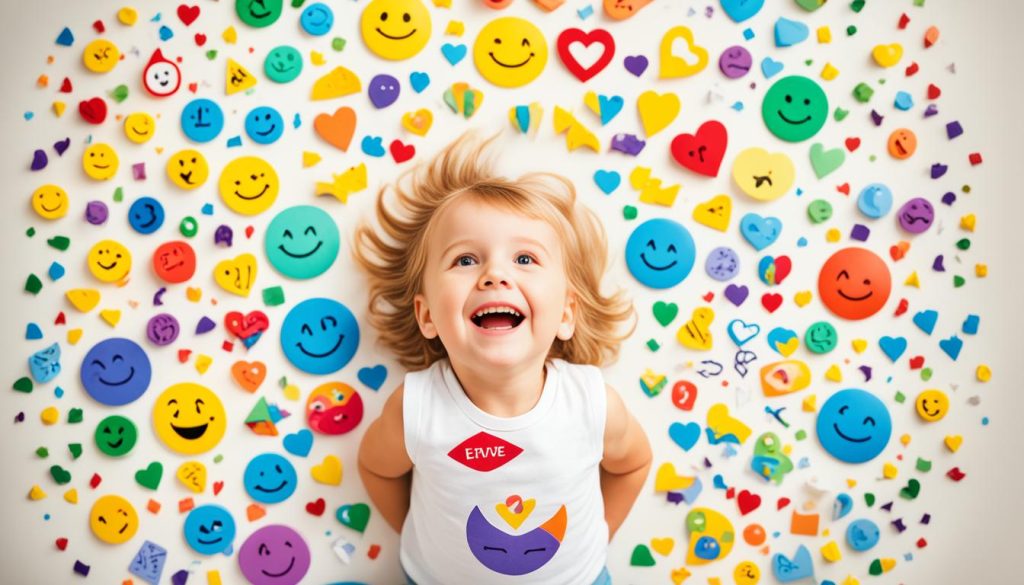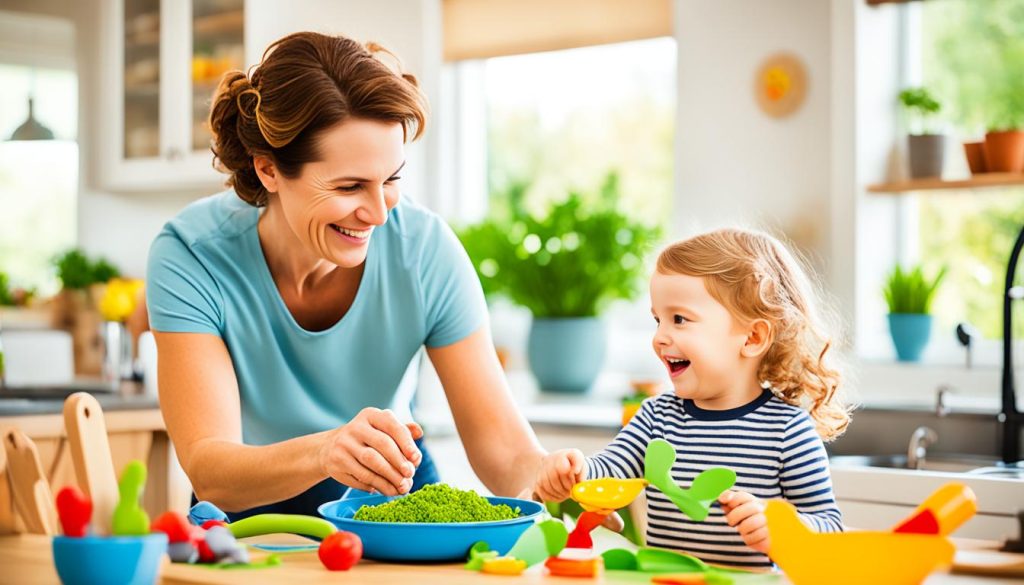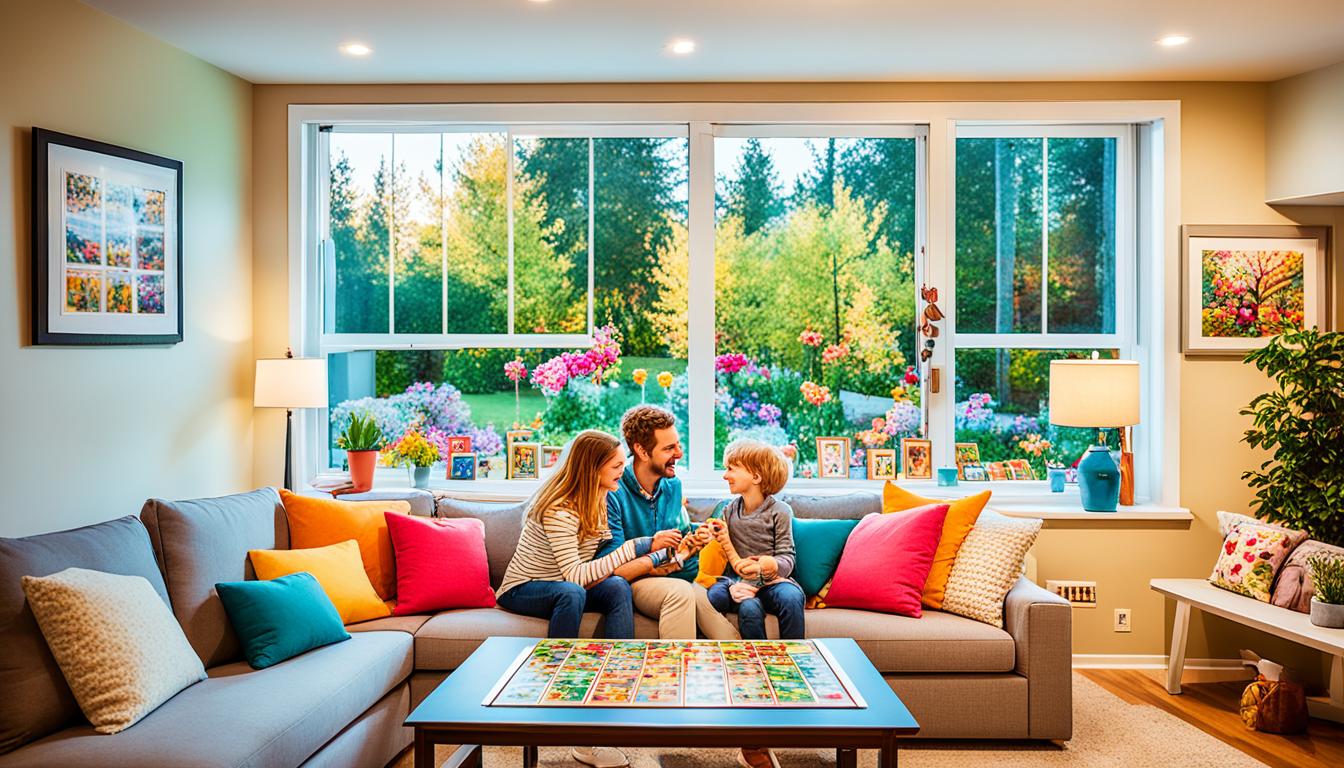Creating a nurturing home is more than just the walls around you. It’s about the warmth and love inside. Think back to your childhood. Remember the laughter and the comfort you felt with those who cared for you?
Now, imagine giving your children that same sense of security and emotional support every day. It’s crucial for their growth. The foundation of their emotional security, self-esteem, and well-being comes from the home atmosphere.
When your home is full of love and open communication, your kids grow up balanced and confident. They become independent and develop better mental and emotional health. This helps them think better and connect with others.
Children who grow up in positive homes have less anxiety and depression. They feel better about themselves and understand others better. This makes them happier and more mentally healthy.
Creating a nurturing home takes more than good intentions. It means being patient, consistent, and intentional. Simple actions like talking openly, supporting each other, and letting kids express feelings are key. For more tips on making a positive home for your kids, check out this detailed blog post.
Key Takeaways
- A positive home environment is key for your child’s happiness and growth.
- An emotionally supportive home lowers anxiety and depression in kids.
- Positive parenting boosts self-esteem, confidence, and emotional smarts in children.
- Open communication and affection at home build secure and loving bonds.
- Showing positive behavior teaches kids respect, kindness, and empathy.
The Importance of Emotional Support and Love
In today’s world, emotional support and love are key for kids to grow well. Studies show that kids do best when they feel safe and loved. This feeling of security helps them grow emotionally smart.
Parents should build a strong, caring bond with their kids. This means making a home where mental health is a top priority. Kids who feel loved and stable are more likely to bounce back from stress and sadness.

Emotion Coaching helps parents and kids connect better. Kids of parents who use Emotion Coaching do better in life. This method, which includes talking about feelings and being understanding, helps even babies as young as ten months.
“Children learn and develop best in environments where nurturing, loving, and responsive relationships are the norm.” – Research Findings
A strong, loving bond creates a safe space for kids to learn about feelings. Parents can start teaching emotional smarts at any time. This leads to better relationships and emotional health for kids.
Research shows a big difference in mental health for kids with enough emotional support. For example, skin-to-skin contact between a mom and baby can cut down crying, help with sleep, and boost brain growth. This builds a sense of safety and love.
- Children learn better in nurturing, loving environments.
- Spending quality time with children supports their emotional and mental health.
- Emotional intelligence can be taught at any stage, enhancing parent-child bonds.
- Positive interactions, such as Emotion Coaching, show long-lasting benefits.
Parents who focus on emotional support and love teach kids important lessons. They learn about making mistakes, asking for forgiveness, and feeling loved unconditionally. These lessons are key for a strong parent-child bond. They help kids feel respected, valued, and secure as they grow.
Creating a Safe Space for Your Children
Keeping your kids safe is key to their well-being and growth. A safe home means they feel secure and ready for the future. It’s all about safety, consistency, and caring for them.

Physical Safety Measures
Childproofing is just the start of keeping your home safe. It’s also important to watch how much screen time they have. Too much screen time can harm their health. Set rules for how they use devices to teach them about responsibility.
Make sure your home is free from dangers and watch them during play to avoid accidents.
Emotional Security and Consistency
Feeling safe emotionally means having a strong bond with your kids. Spend time talking, feeling close, and being there for them. This helps them grow up well.
Having a routine and being steady helps them feel secure. When they share their feelings, listen with care. This way, they learn it’s safe to talk about their feelings.
Creating a safe space means being open and supportive. This helps your kids feel free to express themselves.
| Aspect | Impact |
|---|---|
| Physical Safety Measures | Improves responsible interactions and prevents physical injuries. |
| Managing Screen Time | Prevents overexposure and fosters communication skills. |
| Emotional Security | Reduces risks of anxiety and depression and enhances emotional well-being. |
| Consistency | Ensures children feel safe and behave better. |
| Empathy and Openness | Encourages children to share and builds strong parent-child bonds. |
The Role of Positive Parenting in a Nurturing Home
Positive parenting is key to raising kind, well-adjusted kids. It focuses on cooperation, respect, and love. This approach creates a caring home. Studies show it boosts kids’ grades, emotional health, and behavior.
Using good discipline methods like inductive discipline helps. It cuts down on misbehavior and builds emotional strength. For example, the Gottman Institute’s ’emotion coaching’ program helped 79% of parents see better behavior and well-being in their kids.
“Children who feel loved, accepted, and have consistent positive interactions tend to think more healthily. This lowers their chance of feeling depressed or being overly emotional,” says a 2006 study by Pettit et al.
A caring home is built through positive parenting actions. Showing appreciation boosts a positive outlook and strengthens family ties. Talking openly and honestly also builds trust and openness, as seen in this blog post.

Here’s a look at the differences between authoritative and developmental parenting:
| Parenting Style | Characteristics | Impact on Children |
|---|---|---|
| Authoritative | High responsiveness and high demands | Enhanced emotional regulation, strong social skills, lower levels of anxiety |
| Developmental | Focus on child’s developmental stages and needs | Better cognitive development, improved academic focus, effective behavior regulation |
Supportive parents reduce the chance of depression in kids and teens. Harsh parenting can lead to anxiety and sadness. But positive parenting protects against peer pressure and family stress, helping kids grow in a stable environment.
In conclusion, using positive parenting daily has big benefits for your kids. It builds a world of respect, appreciation, and clear communication. This helps your children grow into kind, responsible adults.
Promoting Open Communication in the Family
Talking openly in the family builds trust and emotional health. Good communication between parents and kids helps kids feel good about themselves. It also creates a safe place for everyone.

Encouraging Honest Conversations
Starting honest talks means showing respect and empathy at home. Kids watch how parents talk and learn from it. So, parents should think about how they talk.
Setting aside time to talk, like during meals, helps tackle tough topics. Looking at your kids and focusing on them shows you care. This makes it easier for them to share their feelings.
It’s important to share feelings and ideas clearly. Open questions keep the talk going and let kids share their worries. Parents should talk in a way that’s easy for kids to understand, especially the little ones.
Being open to all feelings helps kids learn about emotions. This is key for their growth.
Active Listening and Empathy
Listening well is key to a strong bond with your kids. It means looking at them, focusing, and catching the feelings behind their words. Saying back what they said shows you hear and value them.
This makes talking better and brings parents and kids closer. Giving good feedback and praise makes kids more open over time. It makes a safe space for talking about anything.
Regular, meaningful talks with your kids make your family’s feelings better. It creates a respectful place where everyone feels supported and heard.
Incorporating Play and Creativity
Encouraging your child to be creative is key for their growth. Play helps with social, emotional, and cognitive skills. It makes them happy and well-rounded. By doing different activities together, you help your child use their imagination and be independent.
Planning Family Game Nights
Family game nights are great for your child’s independence and making memories. They teach teamwork and friendly competition. Choose games that fit your child’s age and everyone can play.
These games help kids solve problems, think strategically, and work as a team. Play is important for their development.
“Research shows creativity is key for kids. It lets them be themselves and boosts their emotional health.”
Supporting Artistic Activities
Encouraging your child’s creativity through art is great. Give them crayons, paints, playdough, and more. They can play with shapes and colors.
This helps them make choices and be unique. Activities like drama, music, and crafts improve their skills and understanding.
Here is a look at how different creative activities help kids:
| Activity | Benefits |
|---|---|
| Art and Craft | Enhances imagination, fine motor skills, and understanding of basic elements. |
| Drama | Develops vocabulary, empathy, storytelling skills, and imagination. |
| Music and Dance | Fosters creativity, expression, and understanding of various concepts like tempo and pitch. |
Play is very important for kids. It helps them explore, solve problems, and make friends. Having a special play area shows how much you value creativity and play at home. This leads to happier, more creative kids who tackle challenges with confidence.
Spending Quality Time Together
In today’s fast-paced world, balancing work and family is tough. But, making time together is key. Studies in the Journal of Marriage and Family show that quality of time with kids matters a lot for their growth.
Creating meaningful moments can start with family traditions and rituals. A weekly game night, a Sunday pancake breakfast, or nightly storytime can bring stability and a sense of belonging. These activities strengthen family bonds and make everyone feel important.
Encouraging child hobbies is great for making kids feel seen and supported. Let your child pick how to spend time, and you’ll see their interests and passions. This boosts their confidence and helps them feel good about themselves.
Simple things like cooking together, playing outside, or having “yes days” can make quality time special. Turning off tech during these times also deepens the connection, making the moments more meaningful.
“By accepting each other’s influence, couples can strengthen their relationship and family dynamic, leading to closer bonds and shared responsibilities in decision-making.”
It’s also important to make time for the couple. Dr. John Gottman’s research shows that regular alone time helps couples turn towards each other more. This balance leads to a happier, more united home for everyone.
| Activity | Benefit |
|---|---|
| Weekly Game Night | Builds family bonds and teamwork |
| Cooking Together | Fosters collaboration and healthy habits |
| Outdoor Activities | Encourages physical health and exploration |
| Reading Together | Enhances literacy and communication skills |
In conclusion, sharing activities, thoughtful time, and family traditions and rituals builds a caring home. These strategies lead to a balanced, happy family life.
Teaching Emotional Intelligence to Kids
Teaching emotional intelligence to children is key for them to understand themselves and others. It helps them communicate better and handle tough feelings. By doing this, you help your child build strong relationships that improve their life in many ways. Parents are key in this by showing good behaviors, guiding, and creating a caring emotional space.
Games and activities are great for boosting emotional smarts. Games like the Conversational EQ card game and Simon Says help kids spot, name, and share their feelings. These fun activities boost emotional awareness and empathy. This makes it easier for kids to deal with tantrums.
It’s important to help kids through tantrums in a good way. Seeing tantrums as normal reactions to big feelings can change how you see them. Instead of scolding, calming down and talking about feelings after a tantrum can be a great lesson.
Teaching kids to be thankful is also key. Being thankful improves their emotional health and helps the family get along better. Simple acts like saying thanks, thinking about the good things in life, or keeping a gratitude journal can really help kids feel more emotionally smart.
Children grow and learn emotional smarts at different times. They start by noticing and understanding emotions early on. As they get older, they learn how emotions affect their actions. Despite more stress in kids today, teaching them emotional smarts can help a lot. It makes sure they’re emotionally smart from a young age.
What parents do every day affects how kids learn emotional smarts. Making a safe, caring place to learn helps kids grow emotionally and improves their brain and learning. Studies show that emotional smarts have a big impact on kids’ lives, making them more successful and happy.
More and more, Emotional Intelligence (EI) activities, games, and toys are becoming part of learning. By focusing on emotional learning, you help your child become more empathetic, socially skilled, and happy. This prepares them to be kind and emotionally smart as they grow up.
| Aspect | Benefits |
|---|---|
| Interactive Games | Enhance social skills, emotional capacity, empathy |
| Managing Tantrums | Develops patience, emotional awareness, constructive handling |
| Teaching Gratitude | Enhances emotional well-being, positive family dynamics |
| Parent’s Role | Modeling, coaching, creating supportive climates |
| Safe Learning Environments | Boosts neurological development, learning capacities |
| Global Inclusion | Importance in curricula, prepares children for future challenges |
Setting Boundaries and Providing Structure
Setting boundaries with kids is key for their growth and emotional health. Rules teach them about limits and give them security. Structure helps them deal with life’s challenges now and later.
Importance of Rules and Consistency
Being consistent is crucial for discipline. Studies show that steady boundaries create a supportive space. Clear rules help kids learn important skills like being responsible and controlling themselves.
About 85% of kids do well with regular routines and schedules. These help them feel good. Parents who set clear boundaries feel better emotionally and have better family relationships.
This is very true for foster and blended families. They often find it hard to keep things consistent but must for everyone’s emotional health. A survey found that self-sacrifice makes setting boundaries hard but necessary for family well-being.
Balancing Flexibility with Discipline
Being consistent is key, but so is being flexible. Letting kids have a say in their space teaches them about consent and limits. Being patient with their testing helps them understand consequences and learn discipline.
Teenagers often take risks if boundaries are unclear. But, talking respectfully and teaching them manners can lower arguments and make them more likely to listen. Talking openly at home helps everyone respect boundaries.
| Aspect | Rigid Boundaries | Flexible Boundaries |
|---|---|---|
| Parent-Child Communication | Minimal | Open Discussions |
| Power Dynamics | Parents Only | Shared with Parental Guidance |
| Behavior Effect | Rebellion or Withdrawal | Higher Levels of Authority and Respect |
Healthy boundaries and structure are not just about control. They create a safe, respected space for kids. Teaching kids manners and using these strategies leads to better interactions and growth.
Creating a Positive Learning Environment
Creating a positive learning space at home is key to your child’s brain growth. Designating areas for learning helps make a calm and productive space. This setup boosts skills like focus, memory, and solving problems.
Designating Learning Spaces
Having specific learning spots at home can really help your child stay engaged. A tidy, quiet area helps your child focus better. It also makes learning a routine, which lowers stress and helps your child get into study mode. Let your child help set up these areas to teach them to be independent.
Encouraging a Love for Reading
Reading a lot and making it a daily habit can really help your child’s brain grow. Reading regularly improves vocabulary, focus, and memory. By offering a wide range of books, you can make your child curious and creative. Praise your child for reading to make them love books even more.
A positive learning space, with love and support, is the best start for school success. These strategies help make a caring place for your child to grow and love learning for life.
FAQ
How can I create a positive home environment for my kids?
Why is emotional support and love crucial for children?
What measures can ensure my child’s physical and emotional safety at home?
How does positive parenting impact child development?
How do I promote open communication in my family?
What are some ways to incorporate play and creativity at home?
Why is spending quality time together important?
How can I teach emotional intelligence to my kids?
What strategies can I use to set boundaries and provide structure?
How can I create a positive learning environment at home?
This post contains affiliate links. If you click on a link and make a purchase, I may earn a small commission — at no extra cost to you. Thank you for supporting this blog and helping me keep the patterns free! Read the full Affiliate Disclosure & Transparency.
